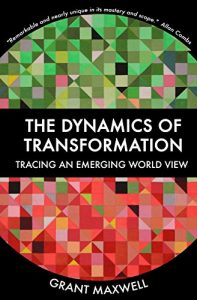"Remarkable and nearly unique in its mastery and scope. There is a poetic sense behind the text that draws the reader along with pleasure."
Allan Combs, Professor Emeritus at the University of North Carolina
"An inspiring vision."
Richard Tarnas, author of The Passion of the Western Mind
"By the time one reaches the end of the argument, one has the sense of having undergone a kind of initiation into an ever-widening community of seekers for whom value and meaning, pattern and purpose are the real stuff of which worlds are made."
Sean Kelly, Professor at the California Institute of Integral Studies
"Nietzsche's Zarathustra said 'I would only believe in a god who knows how to dance'; Maxwell traces out those dance steps, which he calls the dynamics of transformation."
Timothy Desmond, author of Psyche and Singularity
"An important and insightful contribution to understanding the creative transition into a new paradigm of intellectual thought."
Keiron Le Grice, Professor at Pacifica Graduate Institute
In the tradition of books like William James' Pragmatism, Thomas Kuhn's The Structure of Scientific Revolutions, and Thomas Nagel's Mind and Cosmos, The Dynamics of Transformation is a concise and clear presentation of a radically novel theory with the potential to transform the reader's view of the world. The book offers twelve concepts that trace the contours of an emerging world view after the postmodern. Drawing on the work of a wide range of theorists, from Hegel, Carl Jung, Henri Bergson, and Alfred North Whitehead to Jean Gebser, Richard Tarnas, Ray Kurzweil, and Terence McKenna, it provides a framework for understanding how processes change over time. Synthesizing ideas ranging from quantum discontinuity, fractals, and archetypes to qualitative time, teleology, and exponential acceleration, Maxwell shows how these concepts relate to one another in a complexly intertwined network. He suggests that these theoretical approaches are all confluent streams that have gradually been converging over the last few centuries, and that this increasingly potent conceptual flood appears primed for a dramatic entrance into the preeminent currents of academic and intellectual culture.
Allan Combs, Professor Emeritus at the University of North Carolina
"An inspiring vision."
Richard Tarnas, author of The Passion of the Western Mind
"By the time one reaches the end of the argument, one has the sense of having undergone a kind of initiation into an ever-widening community of seekers for whom value and meaning, pattern and purpose are the real stuff of which worlds are made."
Sean Kelly, Professor at the California Institute of Integral Studies
"Nietzsche's Zarathustra said 'I would only believe in a god who knows how to dance'; Maxwell traces out those dance steps, which he calls the dynamics of transformation."
Timothy Desmond, author of Psyche and Singularity
"An important and insightful contribution to understanding the creative transition into a new paradigm of intellectual thought."
Keiron Le Grice, Professor at Pacifica Graduate Institute
In the tradition of books like William James' Pragmatism, Thomas Kuhn's The Structure of Scientific Revolutions, and Thomas Nagel's Mind and Cosmos, The Dynamics of Transformation is a concise and clear presentation of a radically novel theory with the potential to transform the reader's view of the world. The book offers twelve concepts that trace the contours of an emerging world view after the postmodern. Drawing on the work of a wide range of theorists, from Hegel, Carl Jung, Henri Bergson, and Alfred North Whitehead to Jean Gebser, Richard Tarnas, Ray Kurzweil, and Terence McKenna, it provides a framework for understanding how processes change over time. Synthesizing ideas ranging from quantum discontinuity, fractals, and archetypes to qualitative time, teleology, and exponential acceleration, Maxwell shows how these concepts relate to one another in a complexly intertwined network. He suggests that these theoretical approaches are all confluent streams that have gradually been converging over the last few centuries, and that this increasingly potent conceptual flood appears primed for a dramatic entrance into the preeminent currents of academic and intellectual culture.






